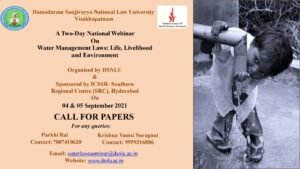About the University
Sharda University, established through an Act passed by the U.P. legislature (14 of 2009) and permitted by the University Grants Commission to award degrees under Section 22 of the UGC Act 1956, is a leading educational institution based in Greater Noida, Delhi NCR. A venture of the renowned SGI group, the University has established itself as a high-quality education provider with a prime focus on holistic learning and imbibing competitive abilities in students. The University is approved by UGC and prides itself in being the only multi-discipline campus in the NCR, spread over 63 acres and equipped with world-class facilities.
The School of law, permitted by Bar council of India letter no. BI: D:834: 2019(LE/Std.17/18/19.08.2019) has been established as a constituent of Sharda University, a private University, The Bar Council of India after inspection of the academic and physical infrastructure has permitted Sharda University for running five- year integrated B.A. LL.B. (Hons.), BBA LL.B. (Hons.), LL.M & Ph.D. programmes. School of Law aims at equipping its Law students not only with the traditional professional expertise to become successful advocates and solicitors but for wide-ranging career options viz. business partnerships, managerial assignments, politics, diplomacy, social work, consultancy assignments, teaching and research work through its wide-based curriculum with an aim to develop intellectual competence and analytical skills coupled with an ethical sense of role and purpose.
About the Seminar
Conflicts and disputes co-exist with society. We cannot avoid conflicts but what is more important is how we manage or handle such conflicts. War/Legal battle is one of the methods of resolution, but we have learnt with our past experiences that it is a costly affair and often unsatisfactory.
Alternative Dispute Resolution (ADR) is an alternative to the adversarial system. Jurisprudence of ADR lies under sec. 89 of CPC, Order 10 Rule 1A, 1B and 1C, In the Constitution of India Art. 39A and many other statutes like the Industrial Disputes Act, Commercial Courts Act, Hindu Marriage Act, Consumer Protection Act, Motor Vehicles Act, etc. recommend ADR mechanism to resolve disputes. At present, the judiciary is clogged with over 3 crore cases pending in various courts all over the country. Covid-19 pandemic has further increased the amount of pendency. The existing judicial system finds it difficult to cope with the ever-increasing burden of litigation. Such state of affairs calls for ADR to step in where the justice system fails, because, as the legal maxim goes “Justice delayed is justice denied”
Arbitration, Mediation, Negotiation, Conciliation, Lok Adalat, Settlement of Disputes etc. are the various methods for settling disputes which have received worldwide recognition and are applied successfully, as they settle disputes in a speedy and amicable manner.
Objectives
- To analyze critically the approach of the judiciary in the implementation of ADR
- To identify and understand the key challenges in effective implementation of ADR at various levels.
- To explore and recognize the role of law and society in dispute resolution.
- To create awareness about the importance of ADR as a part of the justice dispensing system
- To strengthen the implementation of ADR effectively
- To equip the law students and legal professionals with a practical aspect of ADR techniques to opt for independent career options
- To look for futuristic assessment of best practice in the area of ADR and ODR
Expected Outcome
The present seminar has been conceptualized with the objective of appreciating the progress made by India in the sphere of law; while creating space for discussion on matters pertaining to legal issues concerning the implementation of the Alternative Dispute Resolution mechanism in India at various levels.
In this background, there is an incessant call to hold seminars, conferences, workshops, symposia and discussions to elicit valuable inputs from the ground so as to effectively shed light on the usage of the best practices of dispute resolution techniques in India. The Seminar aims to enhance the understanding of the legal issues related to dispute resolution techniques while providing an updated account of law incorporating the recent amendments in the Arbitration and Conciliation Act, 1996.
This National Seminar offers an opportunity for experts from various disciplines comprising Researchers, Academicians, Law Experts, Negotiators, Diplomats, and students to come together and share their valuable opinions.
Call for Paper
The organizers of the seminar called upon the Legal professionals, academicians, practitioners, research scholars, administrators, students, social activists and the representatives of governmental and non-governmental organizations to present their research papers relevant to the below-mentioned themes:
MAIN THEME
APPROACH OF JUDICIARY IN IMPLEMENTATION OF ALTERNATE DISPUTE RESOLUTION
SUB-THEMES
- Legislative Perspectives in Alternative Dispute Resolution
- Judicial Response and Approach in Alternative Dispute Resolution
- Role of State in implementation of Alternative Dispute Resolution
- Legal Service Authorities in Implementation of ADR
- Role of Social Organization (governmental and non-governmental) in the Implementation of ADR
- Alternative Dispute Resolution mechanism and Commercial dispute resolution
- Alternative Dispute Resolution mechanism and Family dispute resolution
- Role of Law & Society in resolving disputes
- The approach of Legislature in Online Dispute Resolution
- emerging trends of Alternative Dispute Resolution
SUBMISSION GUIDELINES
Abstract: An abstract of about 300 words outlining the central theme(s) of the paper.
Cover page: In order to facilitate anonymity, authors must mention their names, contact details and affiliations only on the cover page of the manuscript.
English: Follow British spelling and punctuation conventions. Font Size and Style: Kindly use Times New Roman 12 point for the main text and 10 points for footnotes.
Headings: Theheadingshouldbeusedasperthefollowingstyle Firstheading- 14pt, Bold Centre.
Secondheading-12pt, Bold Left aligned.
Thirdheading-12pt, Italics centre Length: Papers should generally be between 2500 and 3000 words (including footnotes).
Line Spacing: The line spacing of the main text of the paper should be 1.5. The line spacing between footnotes should be 1.0.
Indent: Left and Right indent should be 0.5 on both sides References: Footnotes should be used and not endnotes. Follow a uniform footnote style i.e. ILI footnote style.
References: Footnotes should be used and not endnotes. Follow a uniform footnote style i.e. ILI footnote style.
Copyright: The author shall warrant that the papers submitted for publication do not infringe the copyright of any other person, except agreed otherwise. The copyright of the articles published shall vest with the publisher. The publisher, however, shall not be liable for any copyright infringement.
Co-Author: Maximum 2
REGISTRATION FEE
For Students– ₹ 500 (single authorship)
For Students– ₹ 700 (dual authorship)
For Faculties, Research Scholar & Practitioners – ₹ 1000 (single authorship)
For Faculties, Research Scholar & Practitioners – ₹ 1500 (dual authorship)
Registration fee includes seminar kit, high tea, and lunch excluding accommodation
SUBMISSION DATE
Last date of Abstract Submission (on Email): Sunday, 28st March. 2021 Last date of Full Paper Submission (on Email:
Sunday, 4th April 2021
PUBLICATION OPPORTUNITY
The top ten selected research papers will be published in the form of a book with ISBN number, Name as “Alternative Dispute Resolution and Judicial Approach”
Selection Criteria:
Originality of idea
Soundness of Concept
Plagiarism report (less than 10%)
Research methodology (Preferably empirical research)
Discretion of the selection panel
MODE OF PAYMENT & BANK DETAILS
Payment can be done in cash, through Demand Draft or NEFT in Account no. provided below:
Name of Account Holder: Sharda University, School of Law
Account Number: 912010034705440
Bank: Axis Bank Branch: Axis Bank, Alpha Commercial Belt, Greater Noida, UP
IFSC: UTIB0000624
Demand Draft should be drawn in favour of “Sharda University, School of Law” payable at Greater Noida. Email Id: seminar.law@sharda.ac.in
Registration Link: https://bit.ly/3rbI2fk
CHIEF PATRONS
Hon’ble Shri P. K. Gupta, Chancellor, Sharda University Hon’ble Shri Y. K. Gupta, Pro-Chancellor, Sharda University Shri Prashant Gupta, Executive Director, Sharda University
NATIONAL SEMINAR PATRONS
Prof. P.K. Malhotra, Former Secretary, Ministry of Law and Justice, Govt. of India, Distinguished Professor, School of Law, Sharda University
Prof. Pradeep Kulshrestha, Dean, School of Law, Sharda University.
CONVENER
Dr. Rupendra Prakash Yadav, Associate Professor, School of Law, Sharda University
Dr. Ritu Gautam, Assistant Professor, School of Law, Sharda University.
COORDINATORS
Mr. Avinash Kr. Goswami, Research Scholar
Ms. Sanghapriya Ray, Research Scholar
Ms.Vinita Singh, Research Scholar
Mr. Sahil Lal, Research Scholar
STUDENT ORGANIZING COMMITTEE
Ms. Jyotsna Sharma(B.Tech LL.B-X) – 8076210995, Email Id – 2016006013.jyotsna@ug.sharda.ac.in




